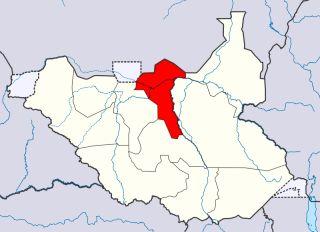Hunger kills 15 in Unity state, local officials say
By Bonifacio Taban Kuich
April 21, 2013 (NYAL) – At least 15 people have died from hunger in South Sudan Unity state’s Payinjiar county following last year’s heavy floods and poor harvests, local officials said.
 Throughout their daily lives, parents and their children reportedly comb through the bushes in search for tree leaves and roots, while others traverse existing rivers looking for fish and water lilies.
Throughout their daily lives, parents and their children reportedly comb through the bushes in search for tree leaves and roots, while others traverse existing rivers looking for fish and water lilies.
With children and expectant mothers said to be severely at risk, authorities in the area have appealed for immediate intervention from the state government, into the dare situation.
Gordon Chieng Mayom, a head chief in Nyal payam [district], described the hunger situation in the area as “out of hand”. He also blames government for allegedly neglecting people in Payinjiar.
“We have raised issues of concern to our government, but nothing has been implemented, despite all these complaints. The issue of roads is very important to us as citizens for our security safety and to have access to all markets in the nearby counties in South Sudan,” Mayom told Sudan Tribune last week.
Those with cows are unable to move freely to sell their animals to other communities, due to poor roads accessibility, he said.
Mayom appealed to donors and humanitarian agencies to intervene in to the hunger situation, which he claims has affected up to 70,000 people in the county.
Nyawich Gatluak Gatbuok, a resident of Gaap Nyal village says the hunger situation was not getting any better, calling for immediate response.
“We are feeding on tree leaves, water lily and wild roots from the bush. That is what we are defending on now, but the worrying thing [is that] we have finished all roots, water lily and leaves in the bush and in water,” said the 45-year old mother.
Kai William Ter, Nyal mixed primary school head teacher, said the hunger situation has not even spared his pupils, who abandoned school in search of food for survival.
“The numbers of [pupils] for last year and this year is not the same due to the situation that we are in. So the numbers have been reducing as pupils have been transferring to other areas where the commodities prices are okay,” Ter said.
The head teacher, however, insists that some pupils had to leave school in order to take care of their parents at home.
“In the family, the pupils have become the parents because they make small business in the market, they go fishing in the river at the evening they are selling the fish, while other pupils have been taken to cattle camps to milk cows for the family,” he said an interview with Sudan Tribune.
Over the last two years, the school got food supplied by the United Nations World Food Programme (WFP), but last year’s floods destroyed roads, cutting off these supplies, the head teacher said.
He however expressed optimism that the programme will resume once the roads become accessible.
(ST)
